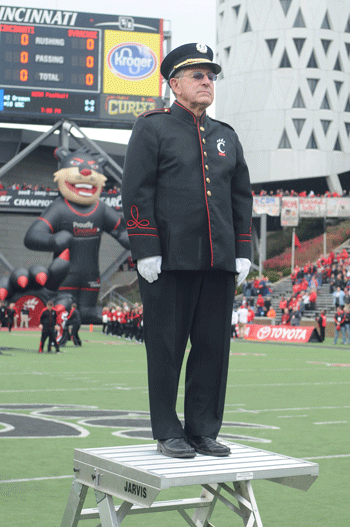With more than 50 years of teaching the marching arts, Dr. Terren L. Frenz—currently director of bands at the University of Cincinnati—has become known for transforming struggling groups into nationally recognized ensembles.
Photos By Robert Sorrell
At 71 years old, Dr. Terren L. Frenz is in what he calls his “second career” as a head marching band director. Last year, he celebrated his 20th anniversary with the University of Cincinnati (UC) Bearcat Bands, which he expanded from 65 students to 300. As a high school and drum corps director for the previous 30 years, Frenz won 11 total national championships and was named “Ohio Teacher of the Year.”
Halftime: Why did you decide to be a band director?
Frenz: When I was 5, my aunt gave me a cornet. I found that pretty slick and took lessons right away. When I got to high school, I had to think about what I wanted to do. My parents wanted me to be a lawyer or a minister. Being a band director gave me the opportunity to be all of those things—a preacher, a teacher, a social worker and a psychologist.
I went to the University of Mount Union, a Methodist school near Canton, Ohio. In undergrad, I majored in music and psychology. I taught for a couple of years and thought I didn’t know as much as I needed to. I earned a masters in music education from the University of Akron and masters in educational administration from Ashland (Ohio) University. I also earned a Ph.D. in music from Columbia Pacific University. I still take classes and seminars.
Halftime: Tell us about your marching and teaching background.
Frenz: My first drum corps was Canton’s Massillon American Legion Drum and Bugle Corps [during high school]. That group became the Bluecoats. I was on that initial board … and have written shows for them and participated in all sorts of ways.
Out of college, I spent three years teaching in Southeast Ohio. I spent a year in a little school that doesn’t even exist anymore. There were only 150 students in the school that year, and I had every student—half in band, half in choir.
Then I went to Barnesville High School and stayed about 2-1/2 years. There were 50 kids and, two years later, 150 kids.
I got recruited back to Canton McKinley and stayed there for six years.
Then the Marlington High School superintendent asked me if I could make the Marlington band the best in the county. That was a good challenge for me. At that time, I had taught about 10 years. I said, “Why are you limiting it to the county; why not set the standard at the city or national level?”
Over the 21 years I worked there, we did very well in marching band contests, which proved to be Marlington’s ticket to recognition. We won close to 200 contests. In those 21 years, that little country school had won seven national competitions in marching band, concert band and jazz band. We did really well, and I was seriously contemplating retiring. Then lo and behold, I got a letter in the mail inviting me to take this job [with UC].
Halftime: How was your adjustment to UC?
Frenz: I commuted from Canton [about four hours] when I came here. But I realized that if this was going to succeed, I needed to have another complete career, and I’ve stayed long enough to have a complete second career. I’m now in my 51st year of teaching. I went from 65 kids in my first rehearsal and have close to 300 kids now.
I was the first full-time band director that they had. Others worked some other place: high school bands or within CCM [UC College-Conservatory of Music]. My only responsibility is the Bearcat Bands. In addition to the marching band, we have two concert bands, four pep bands, three jazz ensembles and an alumni group.
Most of my kids are engineers, doctors, lawyers. It’s a smart kids’ band. When the university saw that, they started paying more attention to the needs of the band. The school built me this facility, hired me four assistants and has been really supportive. Now they’re worried about me leaving, but I don’t have any intentions of retiring or quitting.
Halftime: What were your greatest challenges, and how did you overcome them?
Frenz: My greatest challenges would be scheduling and funding. Finding time to have band practices when everyone can attend has proven to be a major issue. We rehearse as little as any major college band can rehearse. Our requirement is only five hours a week. We rehearse together for two evenings and one time to get together with like instruments.
Currently the band is funded through the Division of Student Life. We’ve relied on the students—the heart of the student, their drive, their desire to have a great band. They raise a lot of money on their own. They give a lot more than they get.
We put our kids in front of large audiences: festivals … parades … bowl games, basketball tournaments, exhibitions at local high school contests. The Bearcat Bands perform about 135 times a year, from Dixieland to full marching band engagements. We get engagements where we break down into 50-piece and 100-piece bands. We get about 400 requests a year.
Halftime: What have been your proudest accomplishments?
Frenz: In my time, we’ve been to 11 bowl games. The football team has grown, and that’s a draw. We were in New Orleans on New Year’s Eve one year. That was cool.
From my high school careers: Winning national championships is a big deal. To be able to do it on a continual basis, it’s like you’re king of the mountain. Doing it once is fun, doing it twice is hard, doing it three or four times is an awful lot of work.
Having the stamina and the will to keep going is a major gift. What keep me going are the students, their vitality and their willingness. The real successes are the student successes. Music is a tool about teaching the dedication to get to a goal. That’s the reward.
Halftime: How did you celebrate your 20th anniversary with UC last season?
Frenz: My wife and my assistants put [a surprise celebration] together. Last year at one of our big football games, I gave the signal for the drum major to start, and nothing happened. I screamed at the top of my voice, “Go!,” and nothing happened. Just about when I was ready to bust a blood vessel, my wife grabbed me and said to look at the board. There’s a picture of me when I’m 20 years old, and they did a 50-year tribute for me.
Halftime: You’ve also been involved with community groups. Tell us about those programs.
Frenz: From 1963 to 1975, I was assistant conductor and arranger for a high school touring group called School Band of America. We made 12 European concert tours in the summers. That’s how I learned to conduct good kids.
I marched with the Erie Thunderbirds for some senior corps experience. In the meantime, Shriners in Cleveland had a drum and bugle corps, adults ages 45 to 75. From 1969 to 1983, I took the corps from 9 people to 76 and won three championships. That was a good lesson on how to teach adults.
I also started a senior drum and bugle corps in 1979 called the Ohio Brass Factory. We competed in Drum Corps Associates. We won one international championship.
Halftime: Drawing from all your various experiences, what advice would you give to other band directors?
Frenz: You need to know your craft. You can’t blame the lack of the kids, the lack of money. You take what you’ve got and make it better. Every place I went, I did that. You can’t take a bad band and make it bigger and expect it to get better. Make it better first, then it will get bigger. Success follows success.
Know the community that you’re in. The mistake that’s made most of the time is the directors take on the community, and they want to do the changing. [However], as you grow with the community, people will start to think your way. It takes an entire career to turn a culture. Don’t give up.
Halftime: And your advice for students?
Frenz: Practice, get as good as you can get. Be true to yourself. Don’t fake it. And then give it away. Share it.


